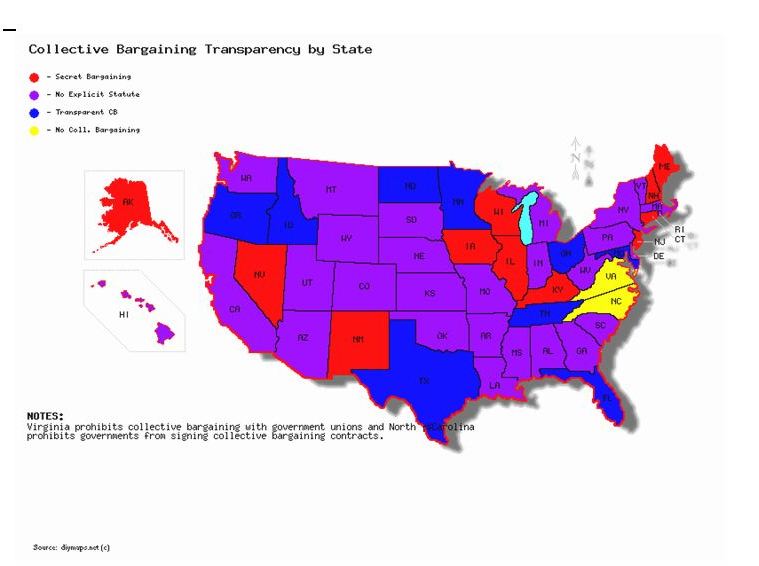
Solution of the week: Transparent Collective Bargaining
Nevada law expressly forbids transparent collective bargaining, despite the fact that negotiations between public-sector unions and public employers, about topics like the expenditures of public funds, is obviously a matter of significant public interest.
NRS 288.220 declares that the following meetings “are not subject to any provision of NRS which requires a meeting to be open or public”:
- Any negotiation or informal discussion between a local government employer and an employee organization.
- Any meeting of a mediator with either party or both parties to a negotiation.
- Any meeting or investigation conducted by a fact finder.
- Any meeting of the governing body of a local government employer with its management representative.
- Deliberations of the [Local Government Employee-Management Relations] Board toward a decision on a complaint, appeal or petition for declaratory relief[1]
Key Points
Transparency does not undermine collective bargaining. Union officials in Nevada claim that collective bargaining proceedings cannot be subject to the state’s Open Meetings Law because it would undermine negotiations. However, several states that require local governments to engage in collective bargaining also require these proceedings to be open to the public.
In Minnesota, where government unions enjoy some of the strongest powers in the nation, the state’s collective-bargaining law still proclaims: “All negotiations, mediation sessions, and hearings between public employees and public employers or their respective representatives are public meetings.”[2]
Likewise, Idaho’s collective-bargaining law declares: “All documentation exchanged between the parties during negotiations, including all offers, counteroffers and meeting minutes shall be subject to public writings disclosure laws.”[3]
Also, in Texas, the law requires that “A deliberation relating to collective bargaining between a public employer and an association … shall be open to the public and comply with state law.”[4]
There is no evidence from these states that collective bargaining has been undermined by transparency.
Management’s incentives in collective bargaining are different in the public and private sectors. Private-sector business leaders must exercise restraint with regard to labor contracts in order to keep their firms competitive and offer goods or services at prices that customers are willing to pay. In the public sector, however, politicians often recognize that government unions can provide electoral support through campaign donations, volunteer hours and other organized efforts. Some politicians have sought out this support by encouraging unionization among government workers and promising compensation packages they know will strain public finances.
Transparent collective bargaining increases the odds that labor contracts reflect community values. Given the lack of incentive for political employers to exercise restraint in the collective-bargaining process, public oversight is critical to ensure that labor contracts agreed to by elected officials reflect the values of the community. If residents approve of collective bargaining agreements, they will continue to elect the political leaders who agree to them and, if not, they will elect new leaders.
Recommendations
Pass a Public Employee Bargaining Transparency Act. If Nevada’s local governments are to engage in collective bargaining with union officials, it should be officially recognized that these proceedings are an important element of the people’s business, as employee compensation constitutes the bulk of local-government spending. Lawmakers can borrow language from Idaho, Minnesota or Texas or use model language available from the American Legislative Exchange Council[5] to bring transparency to collective bargaining.
[1] Nevada Revised Statutes, 288.220.
[2] Minnesota Statutes, 179A.14(3).
[3] Idaho Statutes, 33-1273A(2).
[4] Texas Statutes, Title 5, Subtitle C, 174.108.
[5] American Legislative Exchange Council, “Public Employee Bargaining Transparency Act,” 2011.
Download Solutions: A Sourcebook for Nevada policymakers for more free-market policy solutions from NPRI.